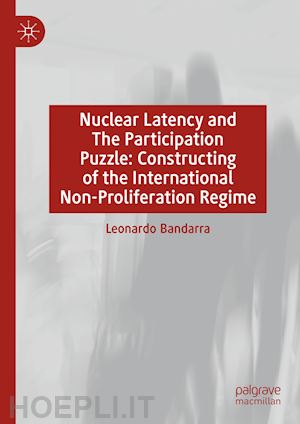

Questo prodotto usufruisce delle SPEDIZIONI GRATIS
selezionando l'opzione Corriere Veloce in fase di ordine.
Pagabile anche con Carta della cultura giovani e del merito, 18App Bonus Cultura e Carta del Docente
Scholars and practitioners usually regard the nuclear non-proliferation regime as composed of two categories of countries – those with and those without nuclear weapons. The latter are regarded as the core designers of that regime, while the former have their prominence in shaping non-proliferation institutions eclipsed or ignored. This book proposes to go beyond that duality by focusing on a usually neglected group of states: latent nuclear countries. Those are the countries that possess advanced nuclear capabilities but no weapons.
This book shows that latent nuclear countries not only participate actively in non-proliferation institutions but also promote the creation of new frameworks highlighting concerns and perspectives different from their nuclear-weapon and nuclear-free counterparts. The author makes this argument through an intricate combination of quantitative and qualitative methods, with an in-depth analysis of Brazil and Germany as sources for case studies. He makes the case to understand the nuclear non-proliferation regime as an inclusive and refined approach that takes into consideration countries’ nuclear capabilities, identities, role conceptions, and domestic structures.
Chapter 1 - Introduction: Nuclear Latency and the Participation Puzzle.- Chapter 2 - “One of Us”: Nuclear Latency and Participation in the Non-Proliferation Regime.- Chapter 3 – A Role Theoretical Approach to Participation: Defining a Causal Mechanism.- Chapter 4 - Into the Macro-Level: A set-theoretical Analysis of Participation in the non-proliferation regime.- Chapter 5 - The Civilian Power: German Nuclear Non-Proliferation Policy and Participation Strategy (1990-2020).- Chapter 6 - The Global Development Power: The Brazilian Non-Proliferation Policy and Participation Strategy (1990-2020).- Chapter 7: Conclusion: Limitations, Contributions, and Policy-Implications.
Leonardo Bandarra is a Postdoctoral Researcher at the University of Duisburg-Essen, Germany, working on nuclear verification, disarmament, and non-proliferation as part of the network “VeSPoTec: Center for Integrated interdisciplinary verification research” (group: “Social-Constructivist Approaches to Trust and Verification) funded by the German Ministry of Education and Research.











Il sito utilizza cookie ed altri strumenti di tracciamento che raccolgono informazioni dal dispositivo dell’utente. Oltre ai cookie tecnici ed analitici aggregati, strettamente necessari per il funzionamento di questo sito web, previo consenso dell’utente possono essere installati cookie di profilazione e marketing e cookie dei social media. Cliccando su “Accetto tutti i cookie” saranno attivate tutte le categorie di cookie. Per accettare solo deterninate categorie di cookie, cliccare invece su “Impostazioni cookie”. Chiudendo il banner o continuando a navigare saranno installati solo cookie tecnici. Per maggiori dettagli, consultare la Cookie Policy.